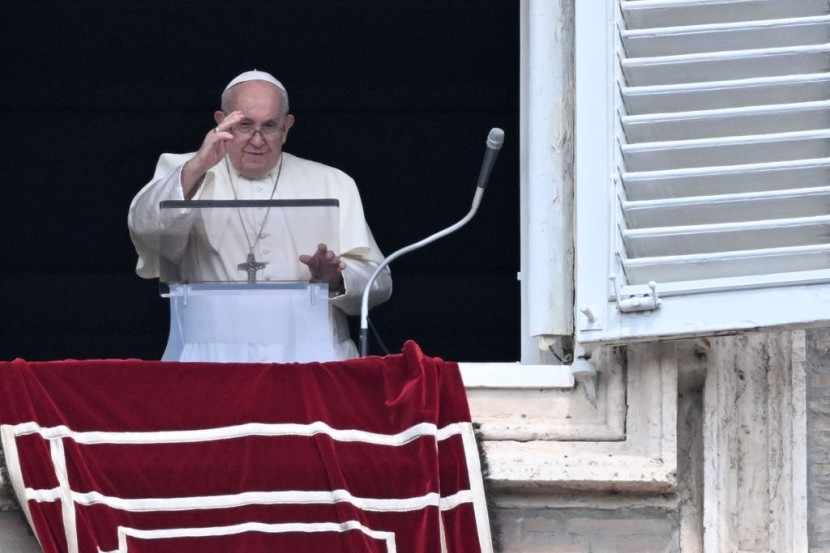
The Vatican has scrambled to clarify and contextualize the recent comments Pope Francis made during a message to Russian Catholic youth in St. Petersburg on Friday (August 25). The pontiff praised 18th-century Russian monarchs Peter the Great and Catherine the Great, and the alleged legacy they left to modern Russia, a legacy Russian President Vladimir Putin invoked on record in justification of his invasion of Ukraine.
"Never forget the legacy," the pope said. "You are the heirs of Great Russia: Great Russia of saints, rulers, Great Russia of Peter I, Catherine II, that empire - great, enlightened, of great culture and great humanity."
His statement was not part of the prepared speech provided by the Holy See's official website. According to Reuters, the prepared speech was addressed in his native Spanish while the improvised message quoting Russia's imperial past was spoken in Italian. The video of the speech was also shared widely online over the weekend.
Russia is a predominantly Orthodox nation, but it has pockets of Catholic communities in both Moscow and St. Petersburg.
POPE FRANCIS CAUSES INTERNATIONAL STORM
— Catholic Arena (@CatholicArena) August 28, 2023
The pope told young Russian Catholics:
"Don't forget your heredity. You are heirs of the great Russia - the great Russia of the saints, of kings, the great Russia of Peter the Great, of Catherine II, the great Russian empire, cultured,… pic.twitter.com/9Tgr5kstSz
Regional Reactions
It could be recalled in the past year that Francis had been consistently supportive of peace and had called the Ukrainians "martyrs" in the fight against Russian forces.
In the early months of the Russian invasion of Ukraine, the pope appeared to avoid picking sides and refrained from overtly criticizing Putin or his religious advisor, Patriarch Kirill. But in May 2022, Francis broke his silence after he warned the Patriarch of Moscow not to "transform himself into Putin's altar boy."
Around the same time this year, the leader of the largest Christian denomination has also received Ukrainian President Volodymyr Zelensky, who has asked Francis to both promote Kyiv's peace plan and condemn Russia's actions but has not done so. Zelensky, on the other hand, refused the pope's mediation.
The pope has also urged all Catholic bishops in the world to consecrate Russia and Ukraine to the immaculate heart of the Virgin Mary, according to the requests she allegedly told to three shepherd children in Fatima, Portugal in 1917.
However, the recent remarks became another reversal of his stance, and have been quickly and strongly criticized in Ukraine and in other countries near Russia that used to be part of the Soviet Union.
Ukrainian Foreign Ministry spokesperson Oleg Nikolenko wrote on Facebook the comments about Russia's "grand-state ideas" which triggered its "chronic aggression" and superiority complex unfortunately "[came] from the pope's mouth," while former Estonian president Toomas Hendrik Ilves said the remarks were "truly revolting."
"It is precisely with such imperialist propaganda, the 'spiritual ties' and the 'need' to save 'great Mother Russia' that the Kremlin justifies the killing of thousands of Ukrainians and the destruction of Ukrainian cities and villages," Nikolenko added.
However, the most hurt of all people are Ukrainian Catholics, who, while sharing the Eastern Christian tradition and liturgy with the Orthodox Church of Ukraine, are in communion with the Bishop of Rome, the Pope's personal capacity.
The head of the Ukrainian Greek Catholic Church, Archbishop Sviatoslav Shevchuk, said in a statement that the pope's remarks caused "pain" and "disappointment" to his flock, and called for the Vatican to clarify Francis's statements to avert "any manipulation of the intentions, context, and statements" assigned to him.
"The examples given by the Holy Father actually contradict his teachings on peace, since he has always condemned any form of manifestation of imperialism in the modern world and warned of the dangers of extreme nationalism, stressing that it is the cause of the 'third world war in segments,'" the archbishop was quoted as per Politico.
Meanwhile, Kremlin spokesperson Dmitry Peskov said the pope's comments were described as very gratifying, commending Francis for what they said was his knowledge of Russian history.
In June 2022, Putin compared himself to Peter the Great, the 18th-century Tsar of Russia who expanded his realm by seizing Swedish land and several Baltic States to become one of the most powerful geopolitical states in Europe at that time. Meanwhile, it was Catherine the Great who first annexed Crimea into the Russian realm in 1783.
Read Also: Poland's State Railway Network Was Hacked; Mishap Potentially Involves Russian Connection
Vatican Responds to Backlash
In response to the diplomatic storm the pope caused, the Vatican government issued a statement Monday (August 28) saying Francis never takes a political stance and that his words were to be read as "a voice raised in defense of human life and the values attached to it."
Vatican officials added the pope always condemned a "morally unjust, unacceptable, barbaric, senseless, repugnant, and sacrilegious" war.
"The Pope intended to encourage young people to preserve and promote what is positive in Russia's great cultural and spiritual heritage, and certainly not to extol imperialistic logics and governmental personalities, cited to point to certain historical periods of reference," Vatican spokesman Matteo Bruni added in a statement.
Moreover, the Vatican embassy in Kyiv issued a statement that "firmly" rejected interpretations that the pope "might have encouraged young Russian Catholics to draw inspiration from historical Russian figures known for imperialistic and expansionist ideas and actions that negatively impacted neighboring populations, including the Ukrainian people," Catholic Review reported.
Pope Francis has appointed the Archbishop of Bologna, Cardinal Matteo Zuppi, as a peace envoy to Ukraine, Russia, and the United States to facilitate peace talks over the summer.








